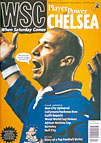 Ken Bates has given the Chelsea job to former players before with mixed results, so Mike Ticher wonders if Gianluca Vialli can cut it
Ken Bates has given the Chelsea job to former players before with mixed results, so Mike Ticher wonders if Gianluca Vialli can cut it
“John Hollins was a mistake. He has a very strong wife. It might have been better if I’d made her manager.”
So said Ken Bates about one of his previous managers. Hollins was his first appointment, taking over in 1985 after John Neal stepped aside with health problems, and his first mistake. Hollins set the pattern for Bates’s taste in managers, and, strange though it may seem, the cherubic trier of the 1970s has a lot in common with the latest incumbent, Gianluca Vialli.
For a start, Hollins was a player at the club before he was its manager. Not just at the start of his career, but also at the end, when he came back to play a role in the side that won promotion in 1984. Like Vialli, the Chelsea job was his first shot at management. And, also like Vialli, hardly anyone had a bad word to say about him on a personal level. It was just the fact that he took a promising team to the brink of relegation in two years that turned the fans against him.
It took a while for the tendency to become a habit. Bates’s next two managers were Bobby Campbell and Ian Porterfield, solid performers from the lower divisions but with little or no experience at the highest level. Campbell brought the club back up spectacularly in 1989 and his team finished fifth the following year, but it was built on the distinctly workmanlike virtues of Graham Roberts, Peter Nicholas and Kevin Wilson and relative success again proved short-lived.
It was in 1993 that Bates truly reverted to type, enticing Glenn Hoddle as player-manager. Again, a player. Again, very limited managerial experience. But no shrinking violet. Possibly Bates under-estimated Hoddle’s stubbornness, and the arrival of Matthew Harding certainly complicated matters. But for whatever reason the relationship ultimately proved unsatisfactory to Bates. Long after Hoddle had departed, Bates noted in that endearing manner of his, that Hoddle had been “besotted by Harding’s bullshit”. In the row over Ruud Gullit’s sacking he repeatedly returned to “the fact that Glenn Hoddle kept prevaricating and then left us high and dry”. It seems a safe guess that if England hadn’t removed Hoddle, Bates would have done the job himself before too long.
And then there was Gullit. A player at the club. No previous experience. Getting the drift? The difference this time was that he was successful. You don’t have to like Gullit as a person to acknowledge his record. Apart from winning the Cup and leaving the club in contention for three trophies this season, Gullit pulled off an amazing achievement, surely unprecedented in the history of Chelsea or perhaps any other club: he didn’t sign a bad player.
OK, perhaps Frode Grodås isn’t exactly Lev Yashin, and others (Lambourde, Babayaro) have yet to prove their worth. But despite buying more than a dozen players, he never made a complete ricket, like paying £2.3 million for Paul Furlong (Hoddle), swapping Graeme Le Saux for Steve Livingstone (Porterfield), investing £635,000 in Alan Dickens (Campbell) or making Jerry Murphy his first capture (Hollins). I could go on.
The exact reasons for Gullit’s departure ultimately don’t matter too much (and anyway, like everyone else, I don’t know what they were). Certainly he asked for a sum of money which the words “a lot” barely begin to hint at. Yet it seems clear that Bates was only too happy to take the opportunity to be rid of him. The unseemly haste with which Vialli was appointed, and the clumsy smear campaign against Gullit through Graham Rix’s “revelations” to the News of the World speak of the level of pre-planning that had gone on and the usual streak of petty vindictiveness which characterises Bates’s attitude to those he perceives as his enemy.
For a while until the smoke cleared it seemed as though the story really was about Gullit. But then came the first match without him and it suddenly became obvious that in fact, as always, it was about Bates. It was about his inability to tolerate over a period of time anyone else in the club who isn’t on the end of his string. And Gullit, whatever faults he may have had, certainly fell into that category. Bates, true to form, picked another figure popular with the fans, but without the experience, the time or the inclination, he hopes, to build any kind of power-base on the non-playing side.
The end result is the soothing of Bates’s restless urges for a while, lots of fun for non-Chelsea fans and more silver for Manchester United. Or, perhaps, someone else who can keep a manager for more than four years, as every title-winning team since 1986 has done.
And so to Vialli. A current player. His first job in management. A patently decent person. It would be nice to think he could buck the trend of optimism in the stands followed by rapid disillusion in the boardroom. But it’s not very likely. As Hollins put it with unintentional accuracy in his first programme notes back in 1985: “I couldn’t think of a better place to start – and finish! – my management career.”
From WSC 134 April 1998. What was happening this month